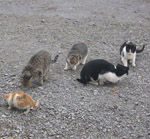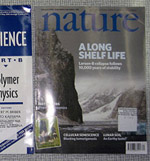Settlement of nomadic Maasai linked to widlife decline in Eastern Africa
 Development,
Development,  Mammals
Mammals  Maasai shelter, Tanzania. Image credit, D. Gordon E. Robertson.From elephants to zebras, giraffes to wildebeests, and gazelles to rhinos, East Africa boasts one of the last remaining, relatively intact hotbeds of grassland megafauna. All this wildlife has coexisted for millennia with the Maasai - a society of traditionally nomadic, pastoral people occupying much of Kenya and Northern Tanzania.
Maasai shelter, Tanzania. Image credit, D. Gordon E. Robertson.From elephants to zebras, giraffes to wildebeests, and gazelles to rhinos, East Africa boasts one of the last remaining, relatively intact hotbeds of grassland megafauna. All this wildlife has coexisted for millennia with the Maasai - a society of traditionally nomadic, pastoral people occupying much of Kenya and Northern Tanzania.
But over the last few decades, wildlife has been declining in East Africa. For example, countrywide censuses in Kenya have shown that wildlife populations have shrunk by 35% to 50% over the last 30 years.
Now a new study finds that the cause of this decline may be in part due to widescale changes in Maasai society - specifically the shift from nomadic to permanent settlement and government promoted subdivision of Maasai lands from communal holdings to individual ownership.
Researchers from the African Conservation Centre looked at wildlife population trends over 33 years on two ecologically similar Maasai group ranches. One of the ranches, Kabutei, had undergone subdivision and permanent settlement at the beginning of the study period while the other, Mbirikani Group Ranch, remained communally owned under shifting seasonal pastoral use.
The study found that wildlife decreased sharply on the legally subdivided ranch. Six species (Thomson’s gazelle, Grant’s gazelle, impala, eland, buffalo and giraffe) showed significant negative trends.
Most interestingly, statistical analysis showed that neither an increase in population or the number of huts explained the decline in wildlife. Rather a change in the spatial distribution of settlement after subdivision was the likely explanatory variable.
The researchers hypothesize that permanent settlement by Maasai pastoralists may impact wildlife in two ways:
1) The settlements may directly displace wildlife.
2) The year-round grazing pastures associate with settlement may degrade grassland conditions for wildlife.
These findings indicate that the outlook for wildlife in the region is particularly grim. Shortly after the completion of the wildlife surveys in 2006, Mbirikani Group Ranch began rapid subdivision. The authors warn:
"The accelerating pace of sedentarization (i.e. permanent settlement) due to subdivision poses the largest single threat to wildlife and the health of Kenya’s rangelands, in our estimation. Sedentarization poses a particularly grave threat to the Kenya–Tanzania Rift Valley borderlands, an area identified as the richest vertebrate location in Africa."
--Reviewd by Rob Goldstein
Western, D., Groom, R., & Worden, J. (2009). The impact of subdivision and sedentarization of pastoral lands on wildlife in an African savanna ecosystem Biological Conservation, 142 (11), 2538-2546 DOI: 10.1016/j.biocon.2009.05.025




Reader Comments